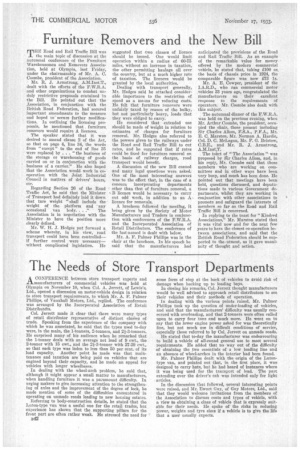Furniture Removers and the New Bill
Page 56

If you've noticed an error in this article please click here to report it so we can fix it.
TFIE Road and Rail Traffic Bill was the main topic of discussion at the autumnal conference of the Furniture Warehousemen and Removers Assoeialion, held at Olympia, last Friday, under the chairmanship of Mr. A. C. Coombe, president of the Association. Mr. R. J. Armstrong, A.M.Inst.T., dealt with the efforts of the F.W.R.A, and other organizations to combat unduly restrictive proposals contained in the Bill. Be pointed out that the Association, in conjunction with the British Road Federation, had -secured important amendments to the measure and hoped to secure further modifications. In outlining the licensing proposals, he mentioned that furniture. removers would require A licences.
The speaker stated that it was desired to amend clause 2 of the Act, so that on page 4, line 34, the words from "except" to the end of line 35 were replaced by . . . "the business of the storage or warehousing of goods carried on or in conjunction with the business of a carrier." He also hoped that the Association would work in cooperation with the Joint Industrial Council in matters of drivers' hours, etc.
Regarding Section 26 of the Road Traffic Act, he said that the Minister of Transport had definitely laid it down that tare weight "shall include the weight of the platform and any occasional van body. . . ." The Association is in negotiation with the Minister to have the position more clearly defined.
Mr. W. H. J. Hedges nut forward a scheme whereby, in his view, road transport could have been controlled— if further control were necessary— without complicated legislation. He suggested that two classes of licence should be issued. One would limit
operation within a radius of 60-75 miles, without an increase in taxation, the other permitting haulage all over the country, but at a much higher rate of taxation. The liceuees would be granted by the local authorities.
Dealing with transport generally, Mr. Hedges said he attached consider able importance to the restriction of speed as a means for reducing costs. He felt that furniture removers were
unfairly taxed by reason of the bulky, but not particularly heavy, loads that they were obliged to carry.
He considered that extended use should be made of weight in relation to estimates of charges for furniture removal. Mr. /ledges also referred to the powers given to the railways under the Road and Rail Traffic Bill to cut rates, and he suggested that if rates could be fixed for furniture removal on the basis of railway charges, road transport would benefit.
A discussion of the new Bill ensued and many legal questions were asked.
One of the most interesting answers was to the effect that, in the case of a concern incorporating departments
other than that of furniture removal, a s B licence would be necessary to carry out odd work, in addition to an A, licence for removals.
A luncheon followed the meeeng, it being given by the Society of Motor Manufacturers and Traders in conjunction with conferences of the F.W.R.A. and the Incorporated Association of Retail Distributors. The conference of the last-named is dealt with below.
Mr. A. F. Palmer Phillips was in the chair at the luncheon. In his speech he said that the manufacturers had anticipated the provisions of the Road and Rail Traffic Bill. As an example of the remarkable value for money offered by the modern commercial vehicle, he stated that, taking £100 as the basis of chassis price in 1924, the comparable figure was now £73 Is.
Mr. A. E. Cowper, president of the I.A.R.D., who ran commercial motor vehicles 33 years ago, congratulated the manufacturers on their excellent response to the requirements of Operators. Mr. Coombe also dealt with this subject.
The autumnal dinner of the F.W.R.A. was held on the previous evening, when Mr. Arthur Coombe, the president, occupied the chair, those present including Sir Charles Allom, P.F.A., Mr. E. C. Marston, Mr. Norman A. Hardie, Col. D. C. McLragan, Mr. F. G. Bristow, C.B.E., and Mr. R. J. Armstrong, A.M.Inst.T.
The Matt of "The Association" was proposed by Sir Charles Allom, and, in his reply, Mr. Coombe said that those members who are working on comraittees and in other ways have been very busy, and much has been done. He pointed out that meetings have been held, questions discussed, and deputations made to various Government departments, whilst they are working in conjunction with other associations to promote and safeguard the interests of members so far as the Road and Rail Traffic Bill is concerned.
In replying to the toast for "Kindred Associations," Mr. Marston stated that it was vital now and for the next few years to have the closest co-operation between associations, and said that the British Road Federation should be supported to the utmost, as it gave unanimity of thought and action.




























































































